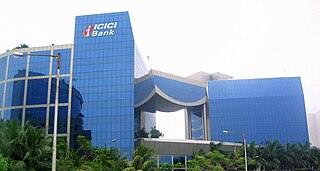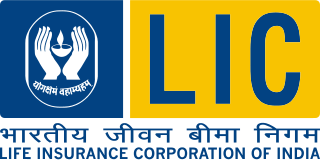Related Research Articles

A financial market is a market in which people trade financial securities and derivatives at low transaction costs. Some of the securities include stocks and bonds, raw materials and precious metals, which are known in the financial markets as commodities.

ICICI Bank Limited is an Indian financial services company with its registered office in Vadodara, Gujarat, and corporate office in Mumbai, Maharashtra. It offers a wide range of banking products and financial services for corporate and retail customers through a variety of delivery channels and specialized subsidiaries in the areas of investment banking, life, non-life insurance, venture capital and asset management. The bank has a network of 5,275 branches and 15,589 ATMs across India and has a presence in 17 countries.
Housing Development Finance Corporation Limited (HDFC) is an Indian financial services company based in Mumbai, India. It is a major housing finance provider in India. It also has a presence in banking, life and general insurance, asset management, venture capital, realty, education, deposits and education loans.

Harshad Shantilal Mehta was an Indian stockbroker. Mehta's involvement in the 1992 Indian securities scam made him infamous as a market manipulator. Although, as reported by the Economic Times, some financial experts believe that Harshad Mehta did not commit any fraud, he had "simply exploited loop holes in the system".
Ketan Parekh is a former stockbroker from Mumbai, who was convicted in 2008 for involvement in the Indian stock market manipulation scam that occurred from late 1998 to 2001. During this period, Parekh artificially rigged prices of certain chosen securities, using large sums of money borrowed from banks including the Madhavpura Mercantile Co-operative Bank, of which he himself was a director. As a result, he was banned from trading in the Indian stock exchanges till 2017.

Life Insurance Corporation of India is an Indian government owned insurance and investment corporation. It is under the ownership of Ministry of Finance, Government of India.
Industrial Development Bank of India was established in 1964 by an act to provide credit and other financial facilities for the development of the fledgling Indian industry. It is a development finance institution and a wholly owned subsidiary of Life Insurance Corporation. Many national institutes find their roots in IDBI like SIDBI, India Exim Bank, National Stock Exchange of India and National Securities Depository Limited.

The Indian real estate sector is collapsing due to increasing costs of financing. Real estate projects in India take a long time to complete due to a complicated regulatory mechanism. Several of India's publicly traded real estate firms are in debt. The inventory of unsold real estate assets is growing and it is expected the market will undergo price corrections. According to the Mumbai-based market research agency, Liases Foras, 30% of the transactions in the real estate sector are done with black money. Experts expect new property prices to fall up to 50% in the next three months in Tier 1 cities.
Axis Bank Limited is an Indian banking and financial services company headquartered in Mumbai, Maharashtra. It sells financial services to large and mid-size companies, SMEs and retail businesses.
The Satyam Computer Services scandal was a corporate scandal affecting India-based company Satyam Computer Services in 2009, in which chairman Byrraju Ramalinga Raju confessed that the company's accounts had been falsified.

Infrastructure Leasing & Financial Services Limited (IL&FS) is an Indian state-funded infrastructure development and finance company.
All India Financial Institutions (AIFI) is a group composed of development finance institutions and investment institutions that play a pivotal role in the financial markets. Also known as "financial instruments", the financial institutions assist in the proper allocation of resources, sourcing from businesses that have a surplus and distributing to others who have deficits - this also assists with ensuring the continued circulation of money in the economy. Possibly of greatest significance, the financial institutions act as an intermediary between borrowers and final lenders, providing safety and liquidity. This process subsequently ensures earnings on the investments and savings involved. In Post-Independence India, people were encouraged to increase savings, a tactic intended to provide funds for investment by the Indian government. However, there was a huge gap between the supply of savings and demand for the investment opportunities in the country.

Yes Bank Limited is an Indian private sector bank headquartered in Mumbai, India and was founded by Rana Kapoor and Ashok Kapur in 2004. It offers wide range of banking and financial products for corporate and retail customers through retail banking and asset management services. On 5 March 2020 in an attempt to avoid the collapse of the bank, which had an excessive amount of bad loans, the Reserve Bank of India (RBI) took control of it. RBI later reconstructed the board and named Prashant Kumar, former Chief financial officer of SBI, as new MD & CEO at Yes Bank. Yes Bank is an associate of State Bank of India which has a 30% stake in the company as of 28 July 2020.
IIFL Holdings Limited d/b/a IIFL and India Infoline, is an Indian diversified financial services company headquartered in Mumbai. The organisation was founded by Nirmal Jain. IIFL and its group companies are backed by Canadian investor Prem Watsa, private equity firm General Atlantic and CDC Group, the UK Government's private equity arm. IIFL is ranked among the top seven financial conglomerates in India and as the top independent financial services firm in India in terms of market capitalisation. Nirmal Jain is the chairman of the group, while R Venkataraman is the group managing director and co-promoter.
LIC Housing Finance Limited is one of the largest Housing Finance Mortgage loan companies in India having its Registered and Corporate office at Mumbai. LIC HFL is a subsidiary company of LIC.

The Saradha Group financial scandal was a major financial scam and alleged political scandal caused by the collapse of a Ponzi scheme run by Saradha Group, a consortium of over 200 private companies that was believed to be running collective investment schemes popularly but incorrectly referred to as chit funds in Eastern India.

Karvy is a financial services company in India. It is involved in financial services like equity, commodities trading, depository and wealth management services and distribution of other financial products. It has its headquarters in Hyderabad, India. It also has branch offices outside India in Bahrain, Dubai, Malaysia, Philippines and the United States.

Dewan Housing Finance Corporation Ltd. (DHFL) is a deposit-taking housing finance company, headquartered in Mumbai with branches in major cities across India. DHFL was established to enable access to economical housing finance to the lower and middle income groups in semi-urban and rural parts of India. DHFL is the second housing finance company to be established in the country. The company also leases commercial and residential premises. DHFL is among the 50 biggest financial companies in India.
The 1992 Indian stock market scam was a market manipulation carried out by Harshad Shantilal Mehta with other bankers and politicians on the Bombay Stock Exchange. The scam caused significant disruption to the stock market of India, defrauding investors of over one billion USD.
References
- 1 2 3 "CBI busts huge fake housing loan scam". Deccan Herald. 24 November 2010. Retrieved 28 November 2010.
- 1 2 "Indian Bankers Arrested in Bribery Case". The Wall Street Journal . 24 November 2010. Archived from the original on 5 December 2010. Retrieved 28 November 2010.
- ↑ Shakhar Abidi (28 November 2010). "Home loan scam: Companies inflated asset value says Economic Offences Wing". DNA . Retrieved 28 November 2010.
- ↑ Meneka Rao (27 November 2010). "Home loan scam: Accused may turn witness in court". DNA . Retrieved 28 November 2010.
- ↑ "BGR Energy, Oberoi Realty deny scam role". The Indian Express. 26 November 2010. Retrieved 28 November 2010.
- ↑ "Sensex nosedives 286 points on jitters over housing-loan scam". The Economic Times. 26 November 2010. Retrieved 28 November 2010.
- ↑ "Pranab plays down housing loan scam". The Economic Times. 27 November 2010. Retrieved 28 November 2010.
- ↑ Debobrat Ghose (26 November 2010). "Now, IT to investigate the home loan scam". Hindustan Times. Archived from the original on 6 December 2010. Retrieved 28 November 2010.